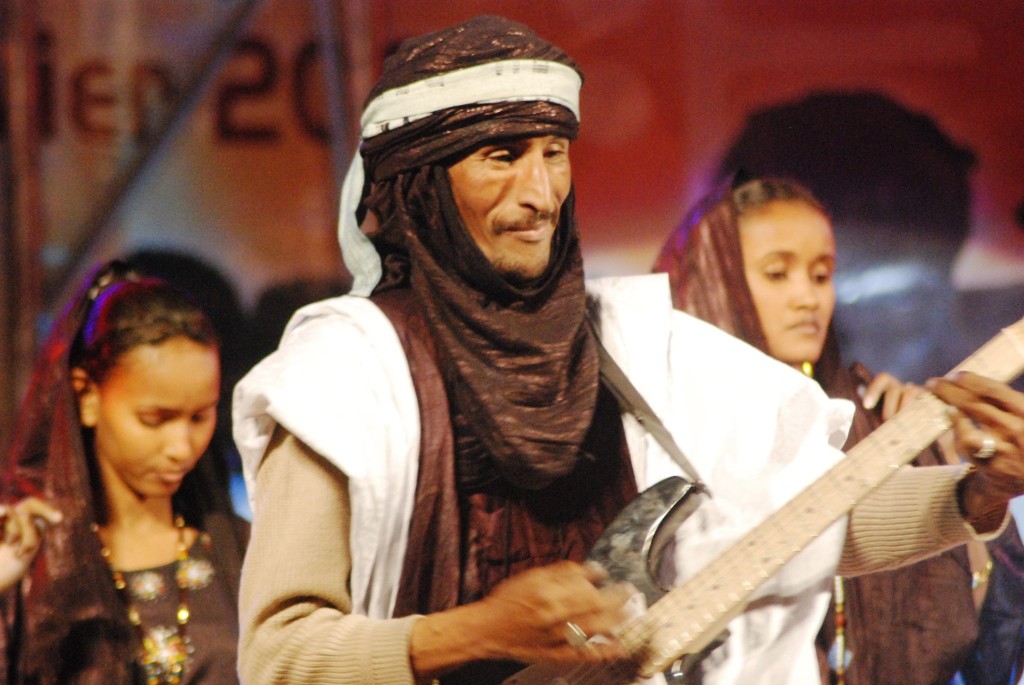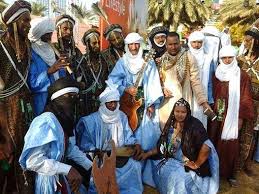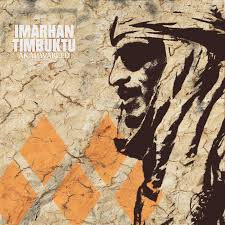Mohamed Issa Ag Oumar El Ansari
Musician living in a Mauritania Refugee Camp
Mohamed Issa Ag Oumar El Ansary, also known as Medissa, is the lead singer in the Tuareg band Imarhan Timbuktu. His band mates are his brother and guitarist Ousmane and their sisters and percussionists Fadimata and Zeinabo. Fadimata Walet Oumar, known as “Disco” and leader of the group Tartit , and Zeina Walet are backup singers. When not touring, Mohamed and his family live with other Tuaregs in a refugee camp in Mauritania. They are refugees because Mali is a dangerous place to live. There is an ongoing conflict among the Tuaregs who are fighting for their independence and the Mali government who restrict their freedom.
Since ancient times, the Tuaregs have lived as nomads in the Saharan interior of North Africa, primarily in Algeria, Niger, and Mali. For centuries the Tuaregs moved about the land not distinguishing from one country’s border to another. Early in the 19th century, the Tuaregs organized into tribes and each tribe was given a region, or confederation, to live. By the end of the century, the French colonists invaded the Tuareg territory. The Tuaregs tried to resist the colonist occupation but failed, resulting in the dismantling of the confederations. In the 1960s, when many African countries became sovereign nations, the traditional Tuareg territory was divided among Niger, Mali, Algeria, Libya, and Burkina Faso. Conflicts resulted between the Tuaregs and other African groups competing for the same resources. The Tuaregs were marginalized and repressed. Uprisings and bloodshed have continued for decades since as the Tuaregs struggle to maintain their identities, value their culture, and fight for an independent homeland while the ruling government maintains control and restricts their liberties.
In 2012, the African Muslim filmmaker Abderrahmane Sissako started working on his film Timbuktu (released in 2015), which shows how the Malians live each day while the jihadis exert their abusive power. As reported on NPR, author Karima Bennoune describes the significance of the film’s exploration as “a portrait both of the reality that people of Muslim heritage have been the first victims of the jihadist groups, [and that] they have also been the first to stand up and resist. You see this in the film with a singer who is flogged for singing, and who then sings while being flogged.” Sissako explains, “It is absurd to try to forbid music,” he says, “because if you try to suppress it, people will sing inside their head.” “Timuktu” was one of five films nominated for a best foreign language 2015 Oscar.
Following Timbuktu is the documentary film, They Will Have to Kill Us First (released in 2016), which shows how powerful and important music is to Malians. Following four Malian musicians personal experiences in Mali (Fadimata ‘Disco’ Walet Oumar, Songhoy Blues, Moussa Sidi, Khaira Arby), the film explores the history of the insurrection by the Islamic terrorists, their imposing of Sharia, and how the Malians in the north and south are affected. The film is a tribute to the Malians music, resiliency, and response to oppression.

Medissa started playing guitar in the 1990s. His guitar has always been a soothing instrument that eases pain and keeps Medissa patient. His music speaks of love, unity, the desert, and its culture and traditions. Medissa believes that all artists who are oppressed need to tell people who they are and that they live on this earth, otherwise they cease to exist. For Medissa, music is a vehicle to tell the Tuaregs about their history, traditions, and culture–nomadic people of the desert that date back to antiquity–and to tell outsiders that the Tuaregs exist.
Imarhan Timbuktu was founded by Medissa in 1993. Imarhan is a Tamashek word that means “those who love”. Timbuktu is their homeland of which they are proud. In 1995, they started touring North and South Mali and on the stage of the Festival au Desert, which has been out of commission since 2012 in northern Mali because of threats. The festival continues in exile, traveling as a caravan joined by artists living in refugees artists, including Medissa and his band Imarhan Timuktu, to different locales. According to the New York Times (January 18, 2015), “An alliance between Tuareg separatists and jihadists from Al Qaeda in the Islamic Maghreb imposed sharia law. Jihadists smashed guitars, burned studios and threatened to kill musicians.” The Festival on the Niger, located in Segou Mali, a few hours from the capitol city Bamako, is planned for February 2015.
Imarhan Timbuktu also performs in Europe and North America. The band’s music, as described on their Facebook page is “dance music. It is protest music. It is music that affirms a culture under siege. Imarhan Timbuktu represents a new wave of Tuareg music, proud of their heritage and bravely looking forward to the future”. They have released their first album Akal Warled in 2014.
Messina will not return to Mali like most Tuaregs in the refugee camp because of the ongoing conflict in Northern Mali (involving the Malian government, the Tuareg separatists, and the Islamic Fundamentalists tied to Al-Qaida). The religious fundamentalists have banned the playing of music other than Koranic verses. There is a war on music and the musicians have fled the desert in the north. The risk in returning could mean losing one’s hand or worse.
Translation:
The central government (in Mali) is only interested in the economy, they’re not interested in the culture or the people, so there’s a misunderstanding. The government is not concerned or interested in the Tuareg culture, the cultural validity of nomadism.
Because the government is ignoring the Tuaregs, an objective of the Tuareg artists is to bring the culture to wider world audiences so that people are aware of their situation in the broader context.
My culture is disappearing and it’s because of the government, which is ignorant. The musicians’ objective is to deliver the message to the government and to communicate to the Tuareg people–who are unable to read—about the needs of health and education, such as reading and life skills. And we want to reinforce the culture and values of our people.
Translation:
A man without a culture is a man without a face. It’s very important—there is a menace and a threat for a cultural loss. In the ’30s, there was a culture of obliteration as there is today. There are many cultures that are threatened and on the verge of disappearing. The richness of a multicultural world is being risked by that effort and now everyone must get going, be engaged because the cultural preservation and valuation of cultural diversity is essential.


